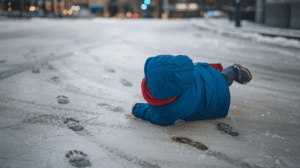Yes, you can sue for slipping and falling in a store if the store was negligent and that negligence caused your injury. Stores have a legal obligation to maintain a safe environment for their customers. This means they must clean up spills, fix hazards, and warn about dangerous conditions.
If the store knew or should have known about the danger and didn’t take action, you likely have a valid slip and fall in store lawsuit. A Boston slip and fall accident lawyer will help you understand your rights and gather the evidence you need.
Whether you were injured in a slip and fall at Target, Aldi, or any other store, you could sue for compensation.
Understanding Premises Liability
Premises liability is a legal concept that holds property owners accountable for maintaining a safe environment on their premises. If someone is injured due to a hazardous condition on the property, the owner is likely to be held legally responsible. In the case of a store, this means the store owner or manager must take reasonable steps to prevent accidents.
Stores have a duty of care to ensure the safety of customers. This includes regularly inspecting the property, cleaning up spills, fixing broken floors, and clearly warning people about any hazards. If they fail to do these things and someone gets hurt, they could be held liable.
When You Can Sue After a Slip and Fall in a Store
You can sue a store if you fall, as long as you prove that the store was negligent. Negligence means the store failed to act in a reasonably careful way, and that failure led to your injury.
To prove negligence, your personal injury lawyer will focus on these key aspects:
- Duty of care: Stores have a legal obligation to maintain their premises in a reasonably safe condition for customers. This involves regularly checking for potential hazards, cleaning up spills, addressing safety issues, and warning customers about risks. If you were legally on the property (e.g., a customer), the store automatically owes you this duty of care.
- Breach of duty: A breach happens when the store does not act as a reasonable business would under the same circumstances, like ignoring a spill or failing to fix a broken tile.
- Causation: The unsafe condition caused your slip and fall, and it wasn’t due to something unrelated. For example, if you slipped because of water on the floor that the store ignored for hours, that condition directly caused your injury.
- Injury and losses: Proving the store was careless is not enough; you must have suffered actual harm. This includes sprains, back injuries, or head trauma. Medical records, doctor’s reports, and photos of injuries help establish this.
Together, these five elements form the foundation of a slip and fall negligence claim. Your slip and fall accident attorney will work to collect evidence, interview witnesses, and build a clear case showing how each of these points applies to your accident.
Common Causes for Slip and Fall Accidents in Stores
There are many ways small acts of negligence could lead to severe accidents in stores. When small issues are ignored, they can cause life-changing injuries such as broken bones, head injuries, or back problems.
Common causes for slip and fall accidents in a store include:
- Wet or slippery floors: Spills from drinks, cleaning supplies, or leaks make floors slippery. If they aren’t cleaned up quickly or warning signs aren’t posted, people will likely slip and get hurt.
- Cluttered aisles: Boxes, merchandise, or cleaning equipment left in walkways can block a customer’s path.
- Poor lighting: Dim or broken lights make hazards hard to see. People will likely not notice a step, a spill, or an obstacle in front of them.
- Wet weather conditions: Rain or snow brought in by customers makes store entrances slippery. Stores should place mats and clean the area regularly to reduce the risk.
- Lack of warning signs: Warning signs should be used if a floor is being cleaned or a hazard is present.
- Improper floor waxing or polishing: Floors that are too shiny or treated with the wrong product become slick and unsafe for walking.
Your slip and fall lawyer will investigate the accident to understand what happened and who is responsible. They will review the accident report and speak with you to get a clear timeline of the events. The lawyer will visit the store to examine the scene, look for surveillance video, and take photos of any hazards like wet floors, uneven surfaces, or poor lighting.
In addition, the lawyer will examine the store’s safety records to determine whether there have been previous complaints or similar incidents. They will request maintenance logs, cleaning schedules, and employee statements to determine whether the store knew about the hazard and failed to fix it.
A Slip and Fall Injury Lawyer Will Help You Sue the At-Fault Party
A slip and fall accident attorney will help you take legal action against the person or business responsible for your accident. At Jason Stone Injury Lawyers, we have been empowering victims to fight for the compensation they need for over 21 years.
Work with a strong legal team that will work hard to get you fair compensation. With our team, you won’t have to pay anything upfront; we only get paid if we win your case. That’s our Stone Cold Guarantee®.
Not Trusting What You’re Being Told?
Better Phone Stone
(800) 577-5188
 START MY NO OBLIGATION CONSULTATION
START MY NO OBLIGATION CONSULTATION








